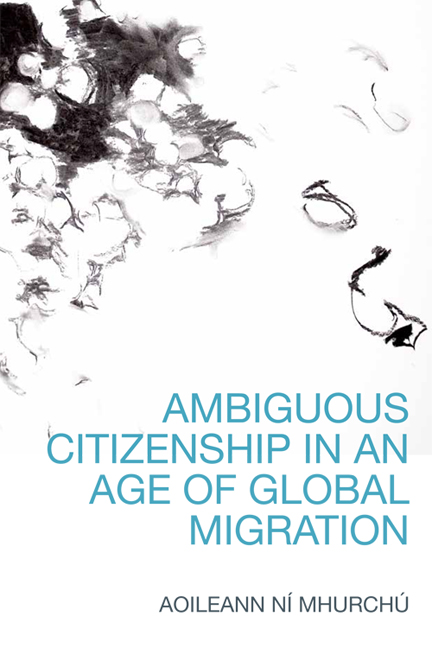Book contents
- Frontmatter
- Contents
- Acknowledgements
- Abbreviations
- Translations
- Introduction
- 1 Exploring the Citizenship Debate: The Sovereign Citizen-Subject
- 2 A Lens: The 2004 Irish Citizenship Referendum
- 3 Trapped in the Citizenship Debate: Sovereign Time and Space
- 4 Interrogating Sovereign Politics: An Alternative Citizen-Subject
- 5 Challenging the Citizenship Debate: Beyond State Sovereign Time and Space
- 6 Traces Rather than Spaces of Citizenship: Retheorising the Politics of Citizenship
- Conclusion
- Bibliography
- Index
2 - A Lens: The 2004 Irish Citizenship Referendum
- Frontmatter
- Contents
- Acknowledgements
- Abbreviations
- Translations
- Introduction
- 1 Exploring the Citizenship Debate: The Sovereign Citizen-Subject
- 2 A Lens: The 2004 Irish Citizenship Referendum
- 3 Trapped in the Citizenship Debate: Sovereign Time and Space
- 4 Interrogating Sovereign Politics: An Alternative Citizen-Subject
- 5 Challenging the Citizenship Debate: Beyond State Sovereign Time and Space
- 6 Traces Rather than Spaces of Citizenship: Retheorising the Politics of Citizenship
- Conclusion
- Bibliography
- Index
Summary
On 10 March 2004 the Irish government announced its plans to hold a referendum on the right to citizenship on the island of Ireland. The Twenty-Seventh Amendment of the Constitution Bill 2004 was initiated in Dail Eireann less than a month later, on 8 April 2004. This proposed that a referendum should be held to decide whether the following additional wording should be inserted into Article 9 of Bunreacht na hÉireann:
Article 9.2.1 Notwithstanding any other provision of this Constitution, a person born in the island of Ireland, which includes its islands and seas, who does not have, at the time of his or her birth, at least one parent who is an Irish citizen or entitled to be an Irish citizen is not entitled to Irish citizenship or nationality, unless otherwise provided for by law.
Article 9.2.2 This section shall not apply to persons born before the date of the enactment of this section.
This was intended to replace the existing constitutional clause (Article 2) governing citizenship, which stated at that time that that it was both the entitlement and birthright of ‘every person born in the island of Ireland … to be part of the Irish Nation and to be citizens of Ireland.’ Once passed by both houses of the Oireachtas, the government, which at that time was a coalition made up of Fianna Fáil (FF) and the Progressive Democrats (PD), announced that the proposal would be put to the people of Ireland in a referendum to be held in conjunction with European and local elections on 11 June that same year. A huge debate ensued over the meaning of Irish citizenship, belonging and the place of migrants in the Irish political community.
This chapter looks at discussions surrounding the 2004 Irish Citizenship Referendum in order to consider the Citizenship Debate in more detail. The 2004 Irish Citizenship Referendum has been described as ‘the most significant event in the politics of immigration in the Republic of Ireland’. I consider how discussions about citizenship were narrowly focused around a series of options which can be linked back to state sovereign political imagination: a particularist appeal to state sovereignty and a universalist appeal to post-state and trans-state sovereignty.
- Type
- Chapter
- Information
- Ambiguous Citizenship in an Age of Global Migration , pp. 58 - 95Publisher: Edinburgh University PressPrint publication year: 2014



